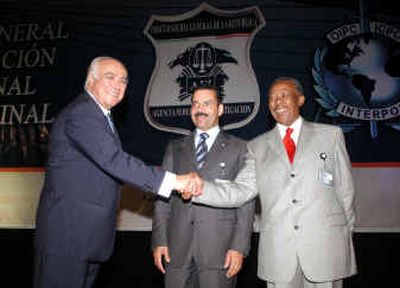Interpol declares terrorism priority

CANCUN, Mexico – The international police agency Interpol ended its annual meeting Friday agreeing terrorism must be its top priority and noting criminals involved in crimes such as prostitution, drugs, weapons smuggling, counterfeiting and passport theft also have links to terrorists.
Interpol’s outgoing president, Jesus Espigares of Spain, predicted the battle against terrorism would be a difficult one.
“Unfortunately terrorism is our focus because they have the advantage on the field, they know when and where they will attack before we do,” he said.
Since the Sept. 11, 2001, attacks in New York and Washington, Interpol, which had coordinated international crime fighting since 1923, has rushed to improve communications systems and databases to identify suspected terrorists as well as criminals engaged in smuggling of all sorts.
Interpol officials said they believe organized crime, drug traffickers and international terrorists use the same money-laundering methods and smuggling routes.
The theme of the group’s four-day meeting was “World Security.” About 500 delegates from around the world attended.
Reporters were not allowed to attend any of the group’s sessions.
“We addressed the global character of crime, increasing everyday in most countries,” Espigares said. “It has no borders.”
South Africa’s former national police chief, Jackie Selebi, was selected as the group’s new president. He will serve four years.
Key among issues discussed was how to expand Interpol’s Internet database of suspected criminals, crimes and other information. Federal agents in major U.S. and European cities can access the database via computer, but in developing nations with poor communications networks, police must call Interpol to identify criminals or fake documents.
Officials here said the database includes information on 6,000 wanted terrorists and at least 4 million fake or stolen passports. Last year, the database listed only 1,000 suspected terrorists and 300,000 stolen documents.
Ronald Noble, Interpol’s executive secretary, said the agency was able to prevent 100 terrorist acts in the last three years.
“That means cooperation with Interpol works and the more we have, the better we become,” he said.
Noble added Interpol’s goal for 2005 is to have most police agencies in the world linked to its network and training teams have already been sent to Afghanistan and Central and South America.
Another Interpol program for next year will be the publication of Project Red Routes, a study on the trafficking of women, which officials said is growing as women from the developing world are lured to work in industrialized countries.
“There are insufficient women willing to enter the industry” in the industrial world, said Hamish McCulloch, head of Interpol’s people smuggling unit. As a result, hundreds of thousands of women are lured to North America, Europe and Japan with promises of legitimate jobs as nannies or waitresses, only to be forced to work as prostitutes.
“They don’t leave because of fear of what might happen to them or their families and children back home,” he said.